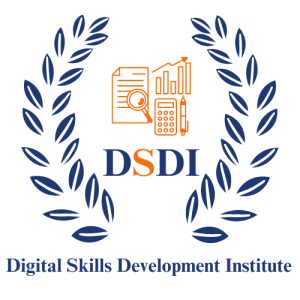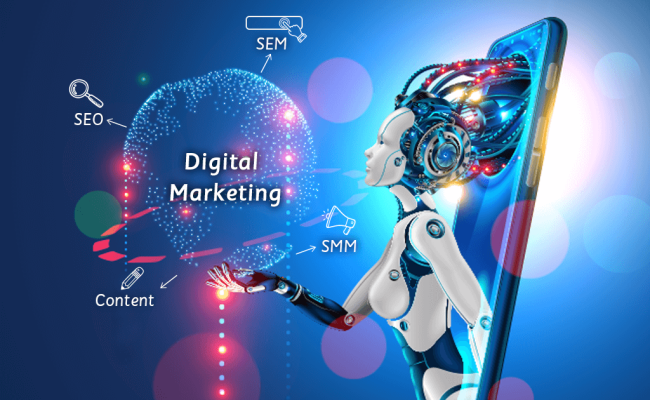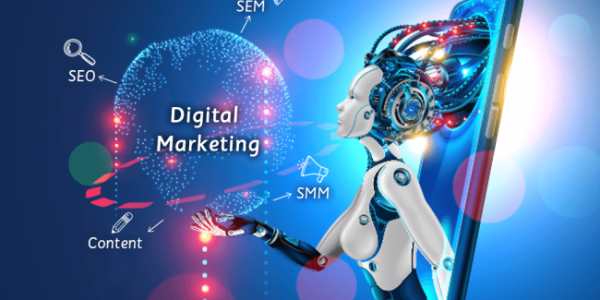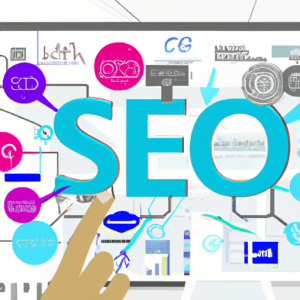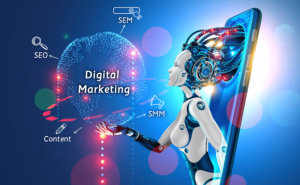I. Introduction
The intersection of artificial intelligence (AI) and digital marketing is not just an exciting trend but is fast becoming a powerful strategy for businesses. In an era where personalization and real-time engagement are crucial, AI helps in crafting optimized marketing strategies that resonate with the target audience. This article will explore various ways AI is revolutionizing digital marketing, from predictive analytics to programmatic advertising and beyond.
II. Understanding Artificial Intelligence (AI) in Marketing
The first step in appreciating the impact of AI in marketing is to define what it entails. In simple terms, AI is a computer science sub-field that develops software or machines that exhibit human intelligence. In marketing, AI analyzes data, trends, and patterns to generate insights, automate tasks, and offer personalized experiences to customers.
The journey of AI in marketing has evolved significantly over the years. From basic algorithms and software programs to advanced machine learning and cognitive computing, the evolution of AI has given marketers unprecedented power to understand their customers and tailor their offerings.
III. The Role of AI in Modern Marketing Strategies
The advent of AI in marketing has been a game-changer. It plays a pivotal role in various aspects of modern marketing strategies, helping marketers provide personalized experiences, automate repetitive tasks, and glean valuable insights from vast amounts of data. AI enables businesses to become more efficient and effective in their marketing efforts, driving higher engagement, conversions, and ROI.
AI’s influence in marketing is only set to grow as technology advances. By keeping abreast of these developments, businesses can stay ahead of the curve, leveraging AI to refine their marketing strategies and achieve their business objectives.
IV. Ways AI is Improving Digital Marketing
- Customer Segmentation and Personalization: AI can analyze vast amounts of customer data to segment audiences based on behavior, preferences, and purchasing history. This segmentation allows for personalized marketing campaigns that speak directly to the customer’s needs, enhancing engagement and conversion rates.
- Predictive Analytics and Customer Insights: AI algorithms can forecast future customer behavior by analyzing past patterns and trends. These predictions help businesses tailor their offerings, anticipate market changes, and make data-driven decisions.
- Content Creation and AI: AI can automate content creation for various marketing materials such as emails, social media posts, and blog articles. Tools like AI chatbots and voice assistants are also transforming customer service by providing instant responses and support.
- SEO Optimization using AI: AI can analyze SEO data to provide actionable insights for optimizing web content. AI tools can also predict future SEO trends, helping businesses stay ahead of the curve.
- Email Marketing and AI: AI enhances email marketing by determining the optimal send times and personalizing email content, leading to higher open and click-through rates.
- AI’s Role in Social Media Monitoring and Management: AI can analyze social media sentiments and trends to manage brand reputation and engage with customers effectively. AI-powered tools can also automate posting schedules, increasing efficiency.
- Enhancing User Experience (UX) with AI: AI can personalize the UX based on user behavior and preferences, leading to higher engagement and conversion rates. For example, AI-powered recommendation engines can suggest products or content based on past user activity.
- AI and the Power of Chatbots: AI chatbots can provide round-the-clock customer service, resolving queries instantly and efficiently. They can also gather customer data, offering valuable insights for improving products or services.
- Programmatic Advertising: Streamlined by AI: AI can automate the buying and selling of online ad impressions, making the process more efficient and cost-effective. AI can also optimize ad targeting based on user data, improving ad relevancy and ROI.
- AI’s Impact on Video Marketing: AI can analyze video performance and audience engagement to optimize video content. It can also automate video creation, making the process more efficient.
- Real-Time Marketing: Achieved with AI: AI can analyze real-time data to deliver personalized content and offers to customers when they are most likely to engage.
- AI’s Influence on Voice Search and Conversational Marketing: As voice search becomes more prevalent, AI can help optimize content and SEO strategies to meet voice search requirements.
- A/B Testing Made Easier with AI: AI can conduct large-scale A/B tests, providing valuable insights into what works and what doesn’t, and guiding data-driven decision-making.
- AI in Influencer Marketing: AI can analyze social media data to identify potential influencers, evaluate their audience engagement, and predict their impact on brand visibility and reputation.
- AI and Augmented Reality (AR): A New Perception: AI and AR can create immersive marketing experiences that drive engagement and sales. From virtual try-ons to interactive ads, the possibilities are endless.
- Behavioral Marketing and AI: Decoding Customer Actions: AI can analyze customer behavior to inform marketing strategies, tailoring content and offers based on individual actions and preferences.
- Sentiment Analysis: AI’s Emotional Intelligence: AI can analyze customer sentiment to understand and respond to consumer emotions, driving brand loyalty and customer satisfaction.
V. AI’s Contribution to Marketing ROI
AI has made significant contributions to marketing ROI by enabling businesses to effectively target and engage with their customers. Through AI-powered analytics and machine learning algorithms, marketers can gain valuable insights into consumer behavior, preferences, and purchasing patterns. This allows them to create personalized and targeted marketing campaigns that resonate with their target audience, leading to higher conversion rates and increased sales. Additionally, AI-powered chatbots and virtual assistants can provide personalized customer support and assistance, enhancing the overall customer experience and driving customer loyalty. By leveraging AI technology, businesses can optimize their marketing strategies, improve ROI, and stay ahead in the competitive market.
By automating repetitive tasks, offering personalized experiences, and providing actionable insights, AI significantly contributes to marketing ROI. AI’s advanced analytics capabilities can track ROI on marketing campaigns, offering a detailed breakdown of what’s working and what’s not, which informs future strategies.
VI. Overcoming Challenges in Implementing AI in Digital Marketing
Overcoming challenges in implementing AI in digital marketing is crucial for businesses to stay competitive in today’s rapidly evolving landscape. One of the main hurdles is ensuring the accuracy and reliability of AI algorithms. As AI relies heavily on data, it is essential to collect and analyze high-quality data to train the algorithms effectively. Additionally, integrating AI seamlessly into existing marketing systems can be a complex task, requiring technical expertise and proper infrastructure. Furthermore, ensuring data privacy and security is paramount, as AI systems often deal with sensitive customer information. Lastly, overcoming resistance to change within the organization and building a culture that embraces AI technology is vital for successful implementation. Despite these challenges, businesses that effectively overcome them can reap the benefits of AI, such as improved customer targeting, personalized experiences, and enhanced marketing strategies.
Despite its benefits, implementing AI in digital marketing comes with its challenges, such as data privacy concerns and the need for technical expertise. Understanding these challenges can help businesses navigate the AI landscape more effectively and leverage AI tools to their fullest potential.
VII. AI’s Future in Digital Marketing: A Look Ahead
The future of AI in digital marketing appears to be promising and exciting. As technology continues to advance, AI is expected to play an even more significant role in the field. It has the potential to revolutionize digital marketing by providing marketers with valuable insights and data-driven strategies. AI-powered tools can analyze vast amounts of customer data, predict consumer behavior, and personalize marketing campaigns to target specific audiences effectively. Additionally, AI can automate tedious and repetitive tasks, allowing marketers to focus on more creative and strategic aspects of their work. With the continuous advancements in AI technology, the future of digital marketing holds immense potential for growth and innovation.
As AI technologies continue to evolve, their impact on digital marketing strategies will only grow. From enhancing personalization to improving efficiency, AI is poised to revolutionize the marketing landscape. By staying informed and adaptive, businesses can make the most of the opportunities that AI presents.
VIII. Conclusion: Summing Up AI’s Role in Digital Marketing
In conclusion, AI has revolutionized the field of digital marketing and has become an indispensable tool for businesses. It has enabled marketers to gather and analyze vast amounts of data in real-time, allowing for more accurate targeting and personalized advertising campaigns. AI-powered chatbots have also enhanced customer experiences by providing instant support and assistance. Additionally, AI has helped optimize search engine rankings and improve content creation by identifying relevant keywords and trends. Overall, AI’s role in digital marketing has not only increased efficiency and effectiveness but has also opened up new opportunities for businesses to connect with their target audience in a more meaningful way.
As we’ve explored, the ways AI can improve digital marketing strategies are vast and varied. By harnessing AI’s power, marketers can unlock new levels of efficiency, personalization, and insight, transforming their approach to engage customers in the digital age.
IX. Frequently Asked Questions (FAQs)
- How is AI impacting the customer experience in digital marketing? AI is transforming the customer experience by enabling personalization at scale, automating customer service via chatbots, and providing a seamless user experience across various digital platforms.
- How is AI enhancing content creation and curation? AI can generate creative content and curate personalized content for individual users. This makes marketing efforts more efficient and effective, as businesses can deliver the right content to the right person at the right time.
- What is the significance of AI in SEO optimization? AI can analyze large volumes of SEO data to provide insights into optimizing web content for search engines. Moreover, AI can predict future SEO trends, giving businesses a competitive edge.
- How is AI improving email marketing strategies? AI enhances email marketing by determining optimal send times, segmenting email lists, and personalizing email content. This leads to higher open rates, click-through rates, and conversions.
- What potential challenges might businesses face when integrating AI into their digital marketing strategies? Challenges can include data privacy concerns, lack of technical expertise, and resistance to change. However, these challenges can be mitigated with appropriate planning and strategy.
